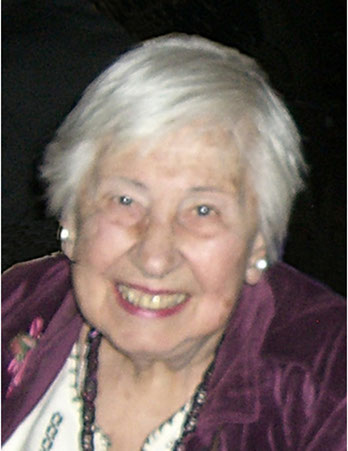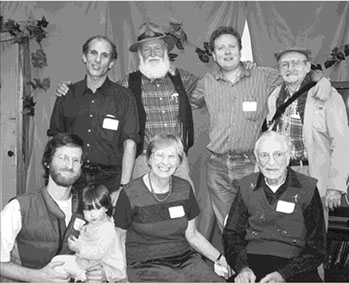
Yolanda "Bobby" Hall
1922-2015

Chicago Friends of the Lincoln Brigade and Ed Balchowsky Committee, in 2000. Standing (l-r): Peter Glazer, Utah Phillips, Brian Peterlinz, Stuart McCarrell; seated: Jeff Balch, Maple Balch, Bobby Hall, and Chuck Hall.
Yolanda ‘Bobby’ Hall
March, 2001
by Joan McGann Morris
Yolanda “Bobby” Hall, the coordinator of the Working Women’s History Project, has been a long time union activist and organizer for many years in the Chicago area.
Joan Morris: Could you tell us how you got involved with the labor movement?
Bobby Hall: Back in the 1930’s my father and mother were members of unions, and my uncle was a tool and die maker from the old country, Hungary. He brought with him both union ideas and Socialist ideas. I grew up with the idea that unions were good things for working people. In the 30’s when I was in High School, the first union activity I remember was collecting food for the Chicago Taxi Driver Strike. This strike became famous because the Chicago Repertory Company Theater with Studs Terkel, put on a play by Clifford Odets, Waiting for Lefty, the story of that taxi strike.
I just went down Armitage Avenue collecting money. I lived between Humbolt Park and Logan Square. I went to the grocery store and butcher shop. It made me very concerned about the big issues that were happening. The activity of the Congress of Industrial Organizations in the 30’s was one of the vivid memories from my teenage days.
Morris: What were some of the issues that unions had to fight for?
Hall: First of all, during the New Deal there was the issue of raising wages because we were coming out of the Depression. Wages were very much lower and the working hours were long. The fight for the eight-hour day took place in the 1870’s. But there were still many problems – not observing time and a half for overtime. Of course, women who were in the lowest paying jobs fought for a chance to get promoted into better jobs and get equal pay.
Morris: You were involved in the union in W. W. II, and you were one of the “Rosie the Riveters.”
Hall: There were a lot of Rosie the Riveters. That was a big opportunity for women to break into skilled jobs and carry part of their responsibility for assuring that this war would be won against Hitler and Fascism. My father was a tool and die maker, a skilled worker, so I decided to work in a war plant. My husband volunteered for the army right after Pearl Harbor.
I went for training at Lane Tech High School and became a tool grinder and I finally got a job at Bendix Aviation Corporation, on Sacramento Blvd. I was the first woman hired for the tool room, and you can kind of guess what happened with the men in there. Well, they thought the tool room was the domain of the males. I was a brand new worker, just learning the job. We were making carburetors for aircraft, and I found tools were hidden on me, and blueprints were changed. There was quite a lot of underhanded and unwelcoming activity.
However, at night my father and my uncle would teach me how to read blueprints and answer all my questions about the tools I had to use. And I found one person who was an old timer, a Swedish American, and his attitude was that we all had to work together for the war effort, and so he was a real tremendous help to me.
But I realized that we had to have a union. The Bendix Company had a union in the main plant in South Bend, Indiana. So workers from South Bend came and helped pass out leaflets and told us what a union could do for us in handling grievances, making it possible for us to negotiate with the company on more even terms.
Morris: Was there a big disparity between the wages for women the wages for men
in the same job at that time?
Hall: No there wasn’t because mostly there were women’s jobs and men’s jobs.
Men were in the tool room and in the maintenance department. They ran lathes
and so on. There was a real struggle to get women promoted to these jobs. Once
they got promoted to the jobs, they received the same wages. So one way of
discriminating against women was to relegate them to the lowest paying jobs.
The CIO was adamant about raising women’s wage scale. After the war women
were laid off and then had to fight for their seniority rights and to maintain their positions
in the more advanced jobs.
Morris: Did most women who were laid off, once the men returned from the war
accept it? Did they want to give up their jobs, or did they want to stay in their positions?
Hall: Oh, there was a very big struggle to keep their jobs, and very often they had to fight even with the union to make sure that seniority was observed. Women resented after helping win the war, being told go back in the kitchen. Basically I think the struggles in the 1970’s for women’s right was the continuation at a new level of what happened in the 1940’s. Efforts to get women into the trades and get into higher paying jobs were enlarged for a good number of years.
Hall: I must tell you about some of the things we did in the union. We had the women working together on social issues like childcare. These problems were not in the province of the union so much previously, but the women brought them to the floor. In our Local 330 eventually I became president. We had about 3000 members in Chicago and Sylvia Woods was the secretary – treasurer, and those of you who have ever seen the film Union Maids, will remember Sylvia Woods. She and Vicky Starr were two of the women who were honored in their struggles in that award winning film.
Morris: And from my research I know that at that time this was highly unusual for a woman to be president of a local.
Hall: Yes, I was the first member in the Illinois Industrial Union Council, who was a woman, and when we went to the convention Sylvia Woods and I became a rather well known team in terms of leadership. We broke through with a number of campaigns that were being done by autoworkers in Detroit and in California and the shipyards. We found that we had to have a women’s rights committee in our international union as well, in order to help educate our fellow unionists, our brother unionists.
Morris: And I know that also in the film Sylvia Woods gives you credit as one of the people who fought against racism at that time within the shops.
Hall: Well we had a mixture of people at that time. Lynchings were still going on in
this country. The Armed Forces were segregated. I mean, the problem of racism
hasn’t been settled today, but it was a lot worse at that time [1940's], and so one of
our first jobs was to bring African American and Hispanic Women into the leadership
of our union. We had steward training classes, where we had training that enabled
our newer members to learn about unionism and to learn the contract and how to
represent their workers. And we faced racism among union members. We’d have
very knockdown drag-out discussions about why we had to work for equality.
If workers were not treated equally the unions would be the losers. It was in
our own self-interest and not just altruism to have workers stick together. Being
united is one of the principles of unionism.
Morris: So united and equal for women, men and people of all races?
Hall: Yes.
Hall: Working with Local 330 after the war when our plant shut down, we had two or three thousand people looking for work. Bendix decided not to do any post-war work in Chicago. The union spent a lot of time helping our workers find new jobs, and get unemployment insurance, which was another thing that unions fought for. But the post war period was a long struggle, and I found it very difficult to get skilled work. I worked in many different jobs and I often got laid off. From my militant union background, I found that I had been blacklisted at least twice that I could document.
Morris: Could you talk about what it meant to be blacklisted and what that meant?
Hall: Well I think what happens is when employers are anti-union, they have a network that identifies who active unionists are. And in the post war period, there was also the well known the McCarthy Red Scare, and unions were painted with a brush of being too radical. There was a very big struggle after the war. Some unions were expelled. So I, like many people, who were more well known, found it difficult to find jobs. I had to leave the skilled trades and take a job in healthcare.
Hall: We are very excited about Women Building Chicago, 1790-1990, A Biographical Dictionary by Rima Schultz, which is being published this year (2001). It will have historical biographies of about 400 Chicago area working women.
This is a 1999 WZRD (88.3 FM) radio interview by Joan McGann Morris, former WZRD member at Northeastern Illinois University in Chicago. She worked on this project with Yahale Yadede, former WZRD Program Director.
"So one way of discriminating against women was to relegate them to the lowest paying jobs.
The CIO was adamant about raising women’s wage scale. After the war women were laid off and then had to fight for their seniority rights and to maintain their positions in the more advanced jobs."
"...the problem of racism hasn’t been settled today, but it was a lot worse at that time [1940's], and so one of our first jobs was to bring African American and Hispanic Women into the leadership of our union."

